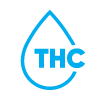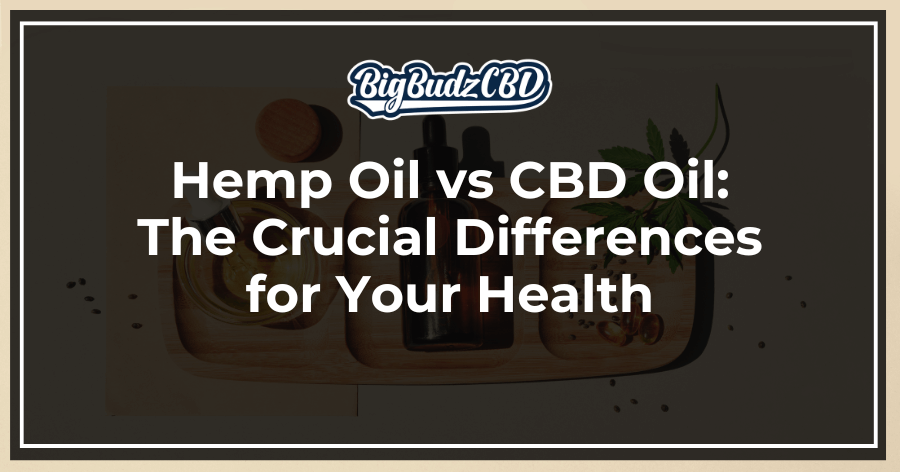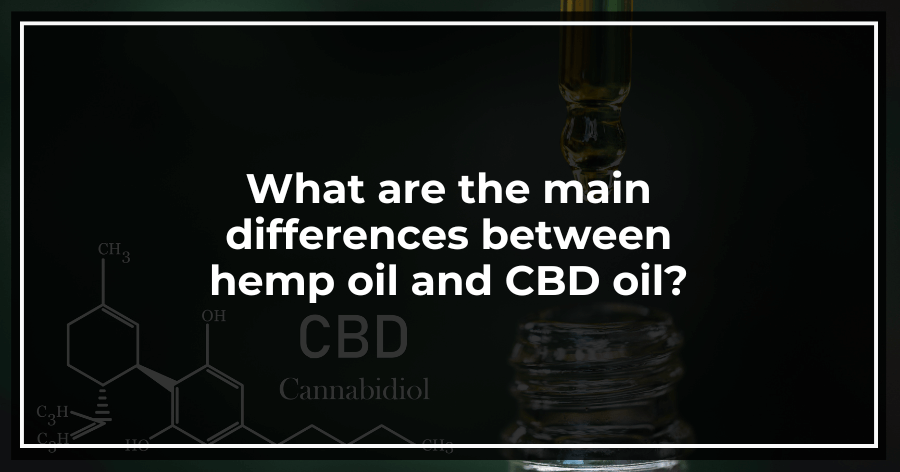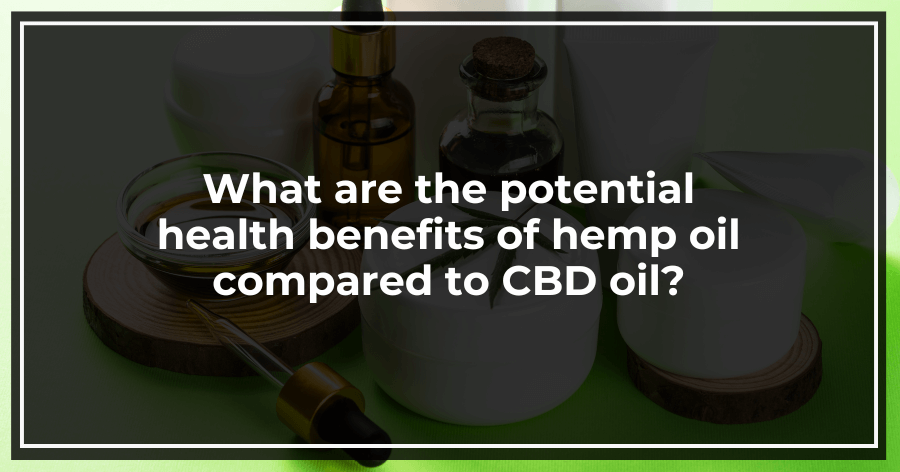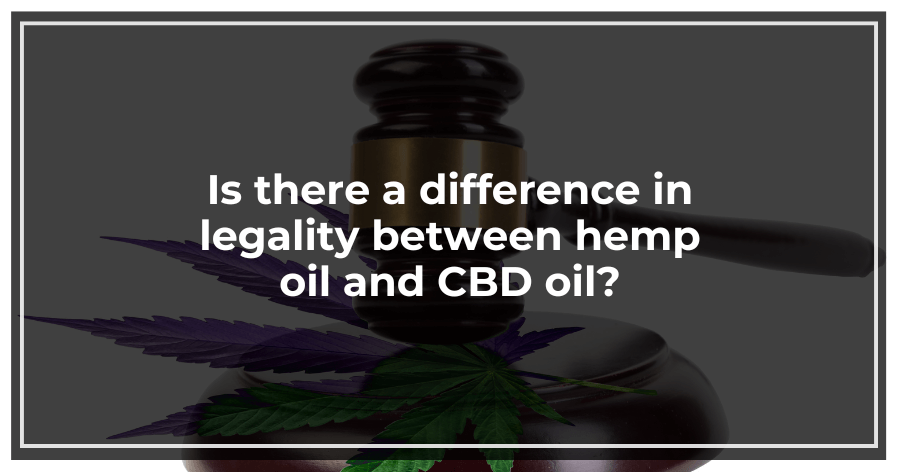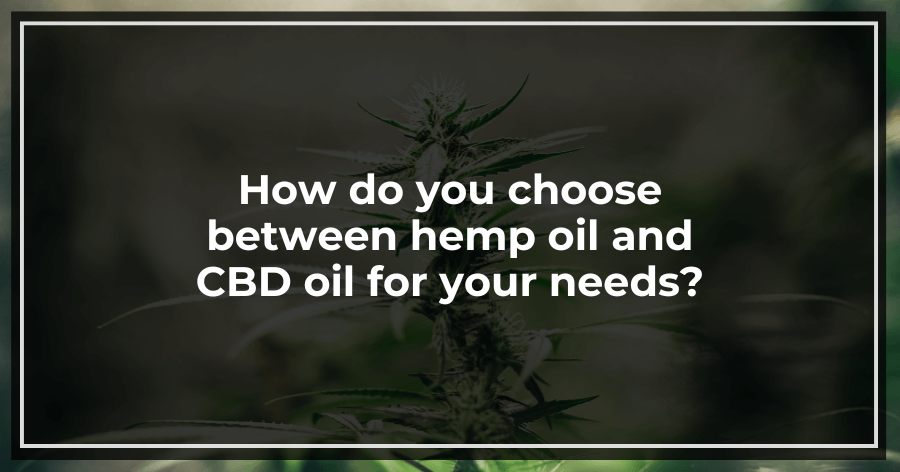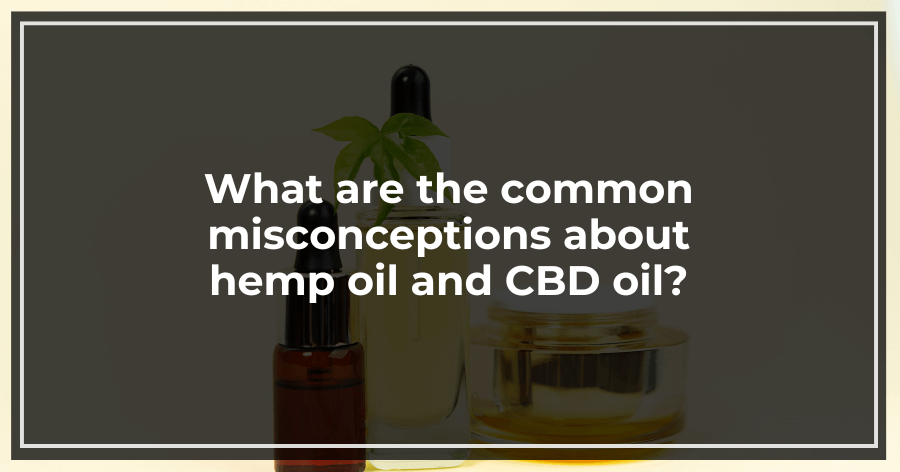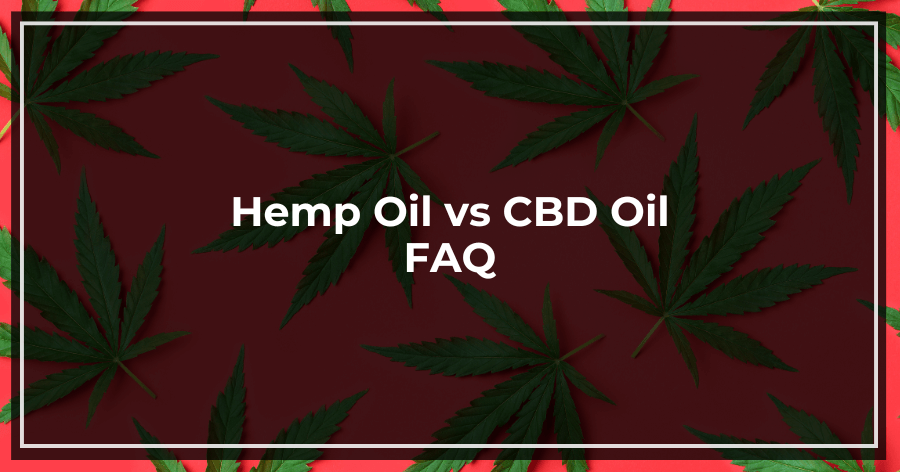You walk into a health store and see “hemp oil” here, and “CBD oil” there – so what is the difference between hemp oil vs cbd oil?
Are they the same? You may have encountered this controversy and been wondering what the difference is.
Many people do.
So let us get to the bottom of this and see what these hemp oils are all about.
Hemp oil and CBD are both derived from the cannabis sativa plant, although they are not the same.
Hemp oil comes from pressing the seeds and contains omega fatty acids, chlorophyll, minerals and no cannabinoids.
It’s great for using in different recipes and foods or taking as a supplement.
CBD oil, on the other hand, is produced from leaves and flowers.
The health benefits or both CBD and hemp seed oil are well known.
Both can be crucial for your health, and we will get into the nitty-gritty details in this post.
When it comes to either changing your diet or intention to try some cannabidiol, the oil you choose makes all of the difference.
In this post, we will explain the differences so that you can choose wisely for whatever your goals might be.
Key Takeaways
- Hemp oil and CBD oil come from different parts of the Cannabis sativa plant
- Hemp oil is rich in omega-3 and omega-6 fatty acids, ideal for nutrition
- CBD oil contains cannabinoids and may offer therapeutic benefits
- Hemp oil is mainly used in recipes and skincare products
- CBD oil interacts with the body’s endocannabinoid system
- Both oils have distinct health applications and legal considerations
What are the main differences between hemp oil and CBD oil?
Hemp oil and CBD oil come from the cannabis sativa plant, although different parts of the plant – and they are both extracted differently.
They are very different in what they offer and how they are used.
Let’s look at these differences to see which might be right for you.
Composition and Source
Hemp seed oil comes from hemp seeds and is a cold pressed cold – using a large seed oil press.
It’s full of omega fatty acids but has no cannabidiol or THC.
CBD oil, however, comes from the hemp plant’s leaves, flowers, and stalks.
It’s full of cannabidiol and might have up to 0.3% THC.
| Characteristic | Hemp Oil | CBD Oil |
|---|---|---|
| Source | Hemp seeds | Hemp leaves, flowers, stalks |
| CBD Content | None | High |
| THC Content | None | Up to 0.3% |
| Omega Fatty Acids | High | Low |
Effects on the Body
Hemp oil and CBD Oil are mostly used for its health benefits.
It’s good for you’re skin and can possibly help reduce inflammation.
CBD oil work with you’re body’s endocannabinoid system.
It may help with anxiety, depression, and pain.
Both oils have their own use in health routines.
Pick hemp oil for nutrition or CBD oil for possible medical benefits.
Always talk to a doctor before trying these products.
Method of CBD Extraction on Effects in the Body
It’s also important to note that different extraction methods of CBD can affect the body differently.
This mainly has to do with the presence of other compounds and cannabinoids that are present in different extraction methods.
For example, a full-spectrum extraction has other terpenes and cannabinoids that can provide an entourage effect, making the effects last longer.
Whereas, a CBD isolate may have a different affect on different people.
What are the potential health benefits of hemp oil compared to CBD oil?
Hemp oil and CBD oil have different health benefits.
They support wellness in unique ways.
Let’s look at their advantages and how they can boost your health.
Hemp Seed Oil’s Wellness Support
Hemp seed oil is full of omega-3 fatty acids.
These are key for heart health.
Studies show it can keep blood pressure healthy and lower cholesterol.
It can also help with skin health.
This can ease symptoms of skin conditions like atopic dermatitis.
Hemp oil is high in fiber.
This is good for your gut and can help with weight control.
Eating foods high in fiber can lead to a lower body weight.
CBD Oil’s Therapeutic Potential
CBD oil is great for easing anxiety and managing pain.
It works with your body’s system to affect mood, stress, and pain.
Research says it can help with both sudden and ongoing pain.
It’s also good for epilepsy, depression, and skin issues.
Its anti-inflammatory effects make it useful for many health problems.
Shared Benefits of CBD & Hemp Oil
Both oils have been said to have anti-inflammatory and antioxidant qualities.
They both can help with overall wellness.
They fight oxidative stress and keep your body in balance.
Even though they have different main benefits, hemp oil and CBD oil can work well together in your health plan.
Always talk to a healthcare provider before adding these oils to your routine, especially if you’re on other meds.
With the right advice, hemp oil and CBD oil can be great for your health.
How are hemp oil and CBD oil extracted and processed?
Hemp oil and CBD oil come from the same plant.
They differ in how they are made and what they contain.
Knowing how they are made helps you pick the right one for you.
Hemp Oil Extraction
Hemp oil is made by cold-pressing hemp seeds, typically with an industrial seed oil press.
This keeps the oil’s nutrients and natural goodness.
The oil is full of omega fats but doesn’t have CBD.
CBD Oil Extraction
Making CBD oil is more complicated and can be a lot more costly depending on your setup.
It uses the hemp plant’s leaves, flowers, and, on some occasions, the stalks (although it’s not typically recommended to use the stalks).
CO2 extraction is one of the most common ways to extract cannabinoids like CBD.
This method gets CBD and other compounds from the plant, and can isolate them from the other compounds.
Processing and Final Products
After making CBD oil, it’s often mixed with a carrier oil like coconut or olive oil. And many brands are also using hemp seed oil as a carrier for their cbd extracts.
This makes the final product you buy more palatable, and the dosage more consistent.
You can find full-spectrum CBD, broad-spectrum CBD, or CBD isolate, depending on how it’s made.
| Product Type | Description | THC Content |
|---|---|---|
| Full-spectrum CBD | Contains all hemp plant compounds | Up to 0.3% |
| Broad-spectrum CBD | Similar to full-spectrum, THC removed | Less than 0.3% |
| CBD Isolate | Pure CBD, no other compounds | None |
The way oil is extracted affects its quality and strength.
CO2 extraction is great because it keeps the good stuff in and removes the unwanted parts.
This makes sure you get a high-quality product that’s true to the plant.
Is there a difference in legality between hemp oil and CBD oil?
The legal status of hemp oil and CBD oil can be complex and varies across regions.
It’s important for consumers to know the differences to buy and use these products legally.
Legal considerations for hemp oil products
Hemp seed oil is totally legal in the United States.
The 2018 Farm Bill made it legal to grow hemp and use its products.
This includes hemp seed oil, which has very little THC and will never get you high.
If the THC level is under 0.3%, hemp oil is legal at the federal level.
In fact that is the legal definition of hemp: any part of the plant containing less than 0.3% THC.
In fact, hemp products have been legally bought and sold in the USA for a few decades now, like hemp fabric, rope, twine and hemp seed hearts.
Legal status of CBD oil across regions
CBD oil’s legal status is more complex.
The Farm Bill made hemp-derived CBD legal, but state laws differ.
Some states allow CBD, while others have stricter rules.
CBD oil’s legal status depends on its source and THC level.
CBD from marijuana is still illegal at the federal level.
Restrictions on purchasing and using these oils
Buying hemp oil is easy because it has little THC.
But, CBD oil has stricter rules.
FDA rules affect how CBD products can be sold.
It’s important for consumers to know their state laws and check the THC level on products.
When traveling, check the laws of your destination.
| Aspect | Hemp Oil | CBD Oil |
|---|---|---|
| Federal legality | Legal | Legal if hemp-derived |
| THC content limit | 0.3% | 0.3% |
| State regulations | Minimal | Varied |
| FDA oversight | Limited | Significant |
How do you choose between hemp oil and CBD oil for your needs?
Choosing the right oil can be hard. You need to know what you want and find the right product.
Let’s look at how to pick the best one.
Factors to Consider with CBD oil and Hemp Oil
Think about why you want the oil.
Hemp oil is good for nutrition and skin.
CBD oil helps with health issues and is more of a mental-emotional support tool.
Your health goals are key to this choice.
- Hemp oil: Great for dietary needs and skin health
- CBD oil: Better for managing specific health issues
Condition-Specific Choices
Some conditions need one oil over the other.
For omega-3, choose hemp oil.
For anxiety or pain, CBD oil might be better.
Ensuring Product Quality
For a quality product, look for these things:
- Third-party testing results
- Clear labeling of potency and ingredients
- Reputable brand with good reviews
Product purity is key. Always check third-party tests to confirm what’s in the oil.
| Feature | Hemp Oil | CBD Oil |
|---|---|---|
| Main Benefit | Nutritional value | Potential therapeutic effects |
| Best For | Dietary supplement | Managing specific medical conditions |
| Key Content | Omega fatty acids | Cannabidiol (CBD) |
Think about these points to choose between hemp and CBD oil.
This way, you pick the best for your health.
Can hemp oil and CBD oil be used together, and if so, how?
Hemp oil and CBD oil have their own benefits.
When you use them together, they work better together.
This can make you feel better overall.
As mentioned previous, some companies actually use hemp seed oil as a carrier oil for their CBD extracts.
Potential benefits of combining hemp oil and CBD oil
Using hemp oil and CBD oil together can help you in many ways.
Hemp oil is good for your health overall.
CBD oil helps with specific health issues.
Together, they can make your body work better and keep you in balance.
- Enhanced anti-inflammatory properties
- Improved skin health
- Better stress management
- Balanced mood and sleep patterns
Risks and considerations for simultaneous use
It’s good to use these oils together, but be careful.
Start with small amounts and slowly add more.
Watch how your body reacts and change as needed.
| Consideration | Action |
|---|---|
| Dosage | Start low, increase slowly |
| Interactions | Consult healthcare provider |
| Quality | Choose reputable brands |
| Monitoring | Track effects and adjust use |
Everyone’s body is different. If you feel bad, stop using them and talk to a doctor.
By being careful, you can use hemp oil and CBD oil safely to help your health.
What are the common misconceptions about hemp oil and CBD oil?
Many people get hemp and CBD oils mixed up.
This leads to confusion about their effects and benefits.
We’ll clear up some common myths to help you make better choices and avoid being taken advantage of.
How do people often confuse hemp oil and CBD oil?
Some think hemp oil and CBD oil are the same.
But they’re not.
Hemp oil comes from hemp seeds and has no THC or CBD.
CBD oil comes from other cannabis parts and might have up to 0.3% THC.
This mix-up causes confusion about their effects and labels.
And it doesn’t help that there are bad players in the market that will sell you a product that is made with hemp seed oil and make you think that it’s actually CBD.
So be very careful to know your source and read the labels.
What are some myths about the effects of these oils that need debunking?
Many believe all cannabis products make you high.
But hemp oil and CBD oil don’t.
Another myth is that they cure all health problems.
While they might help, not all benefits are proven by science and can be different from person to person.
In fact, up to 70% of CBD products might not be correctly labeled.
How can consumers educate themselves about the true nature of these products?
To make smart choices, learn more about these products and their research.
Choose products from trusted brands like Barleans, which have been around for years and test their oils.
Know the differences between full-spectrum, broad-spectrum, and CBD isolate.
Learn about the endocannabinoid system and how cannabinoids work in your body.
By being informed and cautious, you can confidently shop for hemp and CBD oils.
Hemp Oil vs CBD Oil FAQ
Q: What is the main difference between hemp oil and CBD oil?
A: The main difference between hemp oil and CBD oil lies in their source and content.
Hemp oil, also known as hemp seed oil, is extracted from the seeds of the hemp plant and contains little to no CBD.
On the other hand, CBD oil is extracted from the leaves, flowers, and stalks of the cannabis sativa plant and contains high levels of cannabidiol (CBD).
While both come from the cannabis plant, they have different uses and benefits.
Q: What are the benefits of CBD oil?
A: CBD oil offers various potential benefits, including pain relief, reduced anxiety and depression, improved sleep, and anti-inflammatory properties.
Some studies suggest that CBD may help with epilepsy, arthritis, and certain neurological disorders.
It’s important to note that while many people use CBD for these benefits, more research is needed to fully understand its effects.
Q: Is hemp oil the same as CBD oil?
A: No, hemp oil and CBD oil are not the same.
Hemp oil is primarily used for its nutritional value and is rich in omega-3 and omega-6 fatty acids. CBD oil, on the other hand, is used for its potential therapeutic benefits due to its high CBD content.
The differences between hemp seed oil and CBD oil are significant in terms of their composition and uses.
Q: Does hemp oil contain CBD?
A: Hemp oil, particularly hemp seed oil, typically contains little to no CBD.
It is extracted from the seeds of the hemp plant, which do not contain significant amounts of cannabinoids.
CBD oil, however, is extracted from other parts of the cannabis plant and contains high levels of CBD.
If you’re looking for the benefits of CBD, it’s important to choose a product specifically labeled as CBD oil or hemp extract.
Q: What’s the difference between full-spectrum CBD oil and broad-spectrum CBD oil?
A: Full-spectrum CBD oil contains all the naturally occurring compounds found in the cannabis plant, including trace amounts of THC (up to 0.3%).
Broad-spectrum CBD oil also contains multiple cannabis plant compounds, but all THC is removed.
Both types offer the benefits of CBD, but full-spectrum products may provide enhanced effects due to the entourage effect, while broad-spectrum products are THC-free.
Q: Can hemp oil or CBD oil get you high?
A: Hemp oil derived from hemp seeds does not contain THC and cannot produce any psychoactive effects.
CBD oil, whether derived from hemp or cannabis, also doesn’t cause a “high.”
While full-spectrum CBD oil may contain trace amounts of THC (up to 0.3%), this is not enough to produce psychoactive effects.
Only products with significant THC content, typically derived from marijuana, can cause a high.
Q: How do I choose between hemp oil and CBD oil?
A: The choice between hemp oil and CBD oil depends on your specific needs.
If you’re looking for nutritional benefits and a good source of essential fatty acids, hemp seed oil is an excellent choice.
If you’re seeking potential therapeutic benefits related to pain, anxiety, or other conditions, CBD oil may be more appropriate.
Always consult with a healthcare professional before starting any new supplement regimen.
Q: Are there any side effects of using CBD oil?
A: While CBD is generally well-tolerated, some people may experience side effects such as fatigue, changes in appetite, or diarrhea.
CBD can also interact with certain medications, so it’s important to consult with a healthcare provider before using CBD oil, especially if you’re taking other medications.
Hemp seed oil, on the other hand, has very few known side effects when used as directed.









